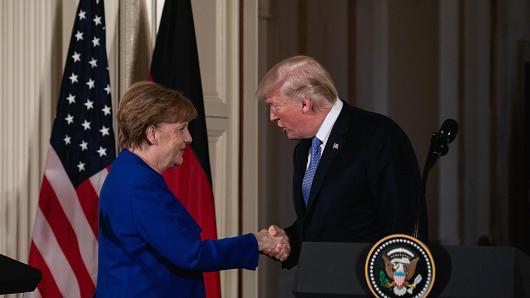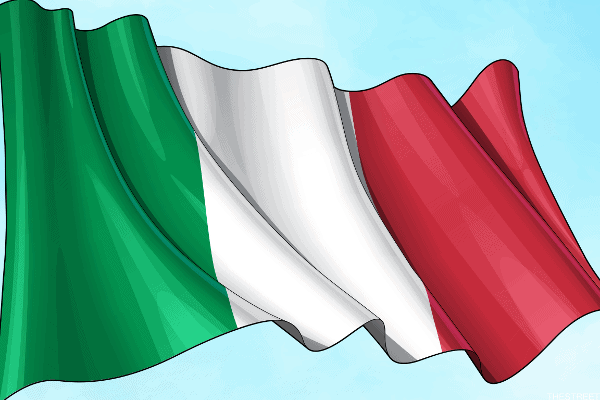
Germany may only account for 3.4 percent of the world economy, but it is more than a quarter of the European Union’s demand and output.
The EU, in turn, is close to 20 percent of the world economy, and, based on last year’s numbers, it takes $283.5 billion of U.S. exports, or 18.3 percent of America’s total goods sold overseas.
What the U.S. sells to the EU is more than 40 percent of all the goods America exports to China and Japan. That shows that the damage caused to the U.S. economy transcends, by far, Germany’s surplus of $64.2 billion on American trades in 2017.
Imagine, for example, what would happen to the EU economy, to the rest of the world — and to U.S. export sales in general — if Germany were not living off its fellow Europeans with a massive 164.4 billion euro trade surplus.
That German surplus is stifling the economic growth in the rest of Europe, because it is a deficit for countries trading with Germany. You can think of those 164.4 billion euros as a large wealth transfer to Germany. Indeed, it is a structural foundation of Germany’s export-driven economy, where sales to the rest of the world account for nearly a half of German GDP (compared with 14 percent in the U.S. case).
Ask nicely — Germany may cooperate
What Europe, the U.S. and the rest of the world need here is a radical change of German economic policies. Germany should be generating more growth from domestic demand to give an opportunity to its trade partners to sell more of their goods and services on German markets. That would boost intra-European growth and create opportunities for more American sales to Europe — its largest overseas customer.
There is nothing new here. It’s a very old story Germans don’t even want to talk about.
And why should they? France is meekly taking it on the chin with annual deficits of 36 to 41 billion euros on its German trades, and the rest of Europe does not dare question what it wrongly sees as a virtuously strong German economy.
Strong, indeed, at their own expense.
So, after the rebuffed Obama administration pleadings to stop suffocating Europe with Berlin-imposed fiscal austerity on deeply depressed economies, America’s new government has been trying to do what Europeans don’t dare. And through it all, the International Monetary Fund, the World Trade Organization and the G-20 (the world’s main economic forum) keep looking the other way and blaming the U.S. for starting trade wars and wrecking the “rules-based multilateral trading system.”
It all sounds like a joke that, inexplicably, U.S. diplomacy continues to tolerate.
After more than a year, Washington is getting nowhere with its complaints about a $151.4 billion trade deficit with the European Union, and the financial burden it carries for NATO allies falling far short of their financial contributions to the common defense.
Now, it looks like the U.S. is losing patience. With the most recent data showing that the trade deficit with the EU is getting worse, Washington is beginning to attack with import tariffs — trade instruments leading to unproductive retaliatory skirmishes that will needlessly inflict a large political damage on trans-Atlantic relations.
Don’t repeat the China error
How about having a different conversation, such as: (a) Do Europeans understand that their large and systematic trade surpluses with the U.S. are wrong, unfair and damaging to the U.S. economy?; (b) If they do, what corrective measures, and over what period of time, are they prepared to undertake to balance their trade accounts with the U.S.?
That sort of conversation should begin, and end, at the highest level of state and government, with the understanding that the relief is being sought among close allies, in an atmosphere devoid of taunts, threats and other unseemly behavior. It should, however, leave no doubt that the Europeans are being asked, firmly, to square their U.S. trade books as promptly as possible.
That is not a naïve choir-boy approach. It is an entirely appropriate entry level discourse, recognizing the simple evidence that the Europeans have a problem, and that they cannot avoid taking action to solve it.
Arguments advanced by the Europeans and the Chinese that America’s fair and reciprocal trades would undermine multilateralism and globalization should be put aside. They are talking forum (e.g., G-20) discussions for another day.
The here and now issue is that Washington has a $595.4 billion problem with China, the EU and Japan. That is an urgent matter whose friendly and orderly solution does not require any regulatory changes to the current world trading system.
Once the political agreement is reached on a decision to balance trade accounts, and on a specific time-frame to reach that objective, trade negotiators could be given instructions on the way to proceed. The key proviso being that the White House, and its counterparts in China, the EU and Japan would continue to closely monitor, and steer, the unfolding trade adjustment process.
But Washington has taken things the other way around. That’s clear in the case of China.
Instead of settling things at the highest political level, the U.S. hit China with import tariffs, forcing Beijing to respond in kind. And then, to limit the political and economic fallout, Washington last week sent State Secretary Mike Pompeo to Beijing in a damage-control exercise.
At the same time, President Donald Trump was gushing with declarations of friendship for Chinese President Xi Jinping, praising China’s help with efforts to rid the Korean Peninsula of nuclear threats.
Xi, most probably, does not believe a word of that. He has no illusion about who the adversary is. He was busy last week inspecting naval assets, exhorting his elite marine troops to get ready to defend China and exchanging messages of “strategic coordination” with his real friend at the Kremlin.
Investment thoughts
With an expected $320 billion euro surplus on goods trade — or a $340 billion euro surplus on goods and services transactions — by the end of this year, Germany has a particular responsibility to stop living off its trade partners by generating more growth from its household consumption, residential investments, business investments and public sector expenditures (i.e., major components of domestic demand).
That would stimulate more foreign sales into German markets, and it would lead to higher growth and employment creation in other EU countries.
The U.S. is exerting pressure on Germany to implement that policy change, while the Europeans are looking on in a perverse solidarity with a country taking 164.4 billion euros of their purchasing power.
Washington has an unassailable trade case, but its ineffective policy approach is likely to cause a train wreck with plenty of damages for everybody around.
The NATO summit in Brussels next month could be the last chance to raise the trade problem to the highest political level, to calm things down and work out an agenda for balancing the trans-Atlantic trade accounts in a friendly, expeditious and orderly manner.
Don’t hold your breath for that. Sadly, the opportunity may well slip away.
Washington needs peace and rapid improvement in its trade accounts with China, the EU and Japan at the time when accelerating inflation will keep pushing up interest rates, causing losses in asset markets and damping the economy’s forward momentum.























